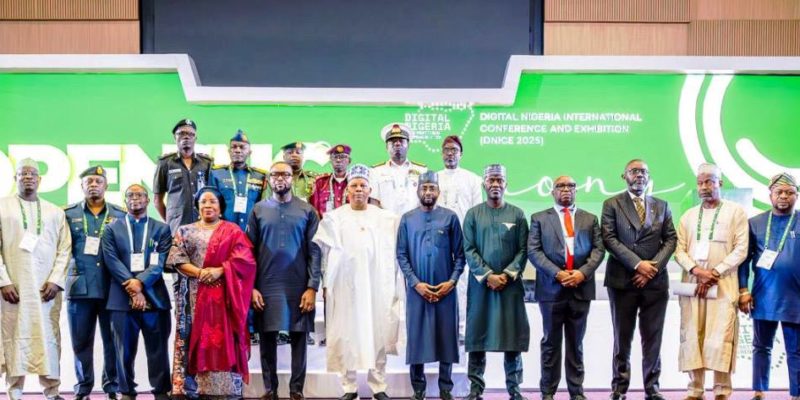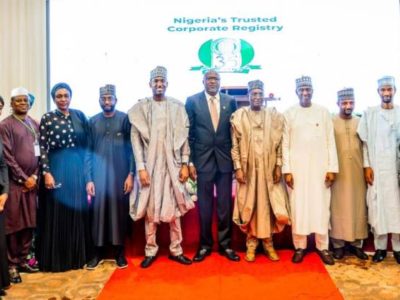By Osasómé C.O and Nana Theresa Timothy
Shettima Declares Nigeria on Cusp of Digital Governance Breakthrough
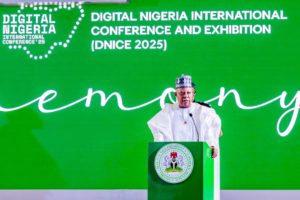
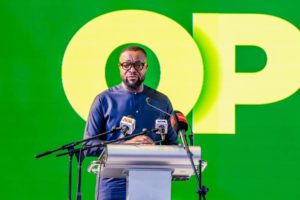
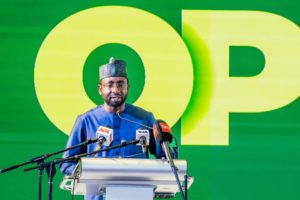
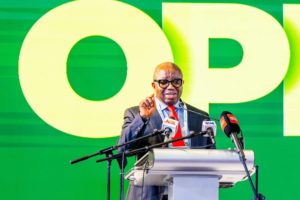
The Nigerian Vice President, Senator Kashim Shettima, has announced that Nigeria stands on the verge of a historic transformation as the government advances toward enacting the National Digital Economy and E-Governance Bill.
RELATED: Nigeria set to enact Africa’s first digital economy and e-Governance law as Tinubu prepares to sign 2025 bill
He made this announcement in Abuja while opening the Digital Nigeria International Conference & Exhibition 2025, themed “Innovation for a Sustainable Digital Future: Accelerating Growth, Inclusion, and Global Competitiveness.”
Bill Seen as Cornerstone of $1 Trillion Vision
Shettima described the proposed legislation as more than a legal reform—it is “a strategic leap toward embedding technology into governance, economic planning, and national development.” He compared it to Nigeria’s earlier cashless policy, saying:
“Just as the cashless policy unlocked the fintech revolution, this new bill will unlock the govtech revolution—an era of smarter governance, greater transparency, and inclusive service delivery.”
He further outlined the government’s broader digital agenda, including:
- Integration of digital literacy into school curricula
- Digitisation of the informal sector
- The 3 Million Technical Talent Programme to build world-class digital skills
Major Infrastructure and Inclusion Initiatives
In his address, Shettima underscored ongoing infrastructure projects such as the Broadband Superhighway (delivering high-speed internet nationwide) and the Bridge and 7-7-4 initiatives, which aim to provide startups in remote towns the same digital connectivity found in major cities like Abia and Lagos. He emphasised that equal digital access is not just fairness—it’s essential for national competitiveness.
Regulatory Reform and Institutional Strengthening
Once passed, the bill is expected to provide a unified legal framework for electronic transactions, digital governance, and cybersecurity. It will strengthen agencies including:
- NITDA (National Information Technology Development Agency)
- NCC (Nigerian Communications Commission)
- NDPC (Nigeria Data Protection Commission)
Shettima envisioned a future where:
- Farmers use real-time market data
- Young women from rural areas work remotely for global companies
- Universities produce graduates ready for the global digital economy
He urged participants to seize the moment and contribute to shaping Nigeria’s digital future.
Minister Tijani Reframes Technology as Citizen-Centric
In his keynote, Dr. Bosun Tijani, Minister of Communications, Innovation and Digital Economy, declared that the conference is more than a tech gathering—it’s a national platform for collaboration between government and industry. Citing the 1999 telecom reform as a turning point, he noted the digital economy now contributes about 18% of Nigeria’s GDP and positions the country as a fintech powerhouse with five of Africa’s nine tech unicorns.
“Digital Nigeria 2025 is not about technology for its own sake. It’s about people… ensuring that every Nigerian can benefit from and contribute to our digital future.”
Youth Take Centre Stage in Nigeria’s Digital Ambition
Director-General of NITDA, Kashifu Inuwa Abdullahi, urged Nigerian youth to lead Africa’s digital transformation, stressing that with an average national age of 18 and a population exceeding 220 million, Nigeria must harness its demographic advantage or risk falling behind.
The 2025 edition of Digital Nigeria attracted over 4,800 participants from 12 countries and 25 Nigerian states, marking a major international convergence of innovators, policymakers, and investors.
NDPC, Industry Leaders Back the Digital Agenda
Dr. Vincent Olatunji, National Commissioner of the NDPC, urged sector stakeholders to collaborate in unlocking Nigeria’s digital potential. He noted there are over 18.8 billion connected devices globally and highlighted Nigeria’s youth—65% of whom are tech-savvy—as a strategic asset. The conference also featured senior dignitaries including Dr. Aminu Wada (NCC), Prof. Abdullahi Yusuf Ribadu (NUC), and others from academia, diplomacy and industry.

